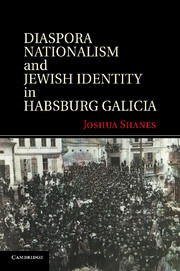Description
Diaspora Nationalism and Jewish Identity in Habsburg Galicia
Author: Shanes Joshua
Explains the construction of the Jewish nation in Galicia, the process by which traditional Jews modernized and the variety of identities they adopted.
Language: English
Subject for Diaspora Nationalism and Jewish Identity in Habsburg Galicia:
Approximative price 49.66 €
In Print (Delivery period: 14 days).
Add to cart
Diaspora Nationalism and Jewish Identity in Habsburg Galicia
Publication date: 07-2014
Support: Print on demand
Publication date: 07-2014
Support: Print on demand
Approximative price 101.82 €
In Print (Delivery period: 14 days).
Add to cart
Jewish identity and nationalist politics in habsburg galicia
Publication date: 08-2012
336 p. · 15.2x22.9 cm · Hardback
Publication date: 08-2012
336 p. · 15.2x22.9 cm · Hardback
Description
/li>Contents
/li>Biography
/li>
The triumph of Zionism has clouded recollection of competing forms of Jewish nationalism vying for power a century ago. This study explores alternative ways to construct the modern Jewish nation. Jewish nationalism emerges from this book as a Diaspora phenomenon much broader than the Zionist movement. Like its non-Jewish counterparts, Jewish nationalism was first and foremost a movement to nationalize Jews, to construct a modern Jewish nation while simultaneously masking its very modernity. Diaspora Nationalism and Jewish Identity in Habsburg Galicia traces this process in what was the second largest Jewish community in Europe, Galicia. The history of this vital but very much understudied community of Jews fills a critical lacuna in existing scholarship while revisiting the broader question of how Jewish nationalism - or indeed any modern nationalism - was born. Based on a wide variety of sources, many newly uncovered, this study challenges the still-dominant Zionist narrative by demonstrating that Jewish nationalism was a part of the rising nationalist movements in Europe.
1. Galician Jewry under Habsburg rule: the first century, 1772–1883; 2. Neither Germans nor Poles: Jewish nationalism before Herzl, 1883–96; 3. Building a nation of readers: the emergence of a Yiddish populist press in Galicia; 4. A broadening audience: organizational and ideological change, 1896–1904; 5. The 1907 parliamentary elections and the rise of Jewish mass politics.
Joshua Shanes is Professor of Jewish Studies at the College of Charleston. His past awards include the Jacob Javits Fellowship, the Fulbright Fellowship and awards from the National Foundation for Jewish Culture and the Memorial Foundation for Jewish Culture. He was also a fellow at the Center for Advanced Judaic Studies at the University of Pennsylvania and a fellow of the International Forum of Young Scholars on East European Jewry. He has published widely on Jewish cultural and political history in such journals as Jewish Social Studies, Nations and Nationalism, Polin, the Austrian History Yearbook and the YIVO Encyclopedia of Jews in Eastern Europe.
© 2024 LAVOISIER S.A.S.




